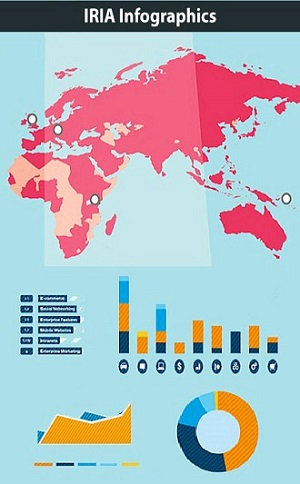What does Pelosi’s Taiwan trip mean for US-China relations?

Some found it unnecessary and provocative, while others termed it a brilliant way to make a geopolitical statement, Pelosi’s trip to Asia reached its climax when she landed in Taipei despite China’s repeated warnings. The Speaker of the United States House of Representatives concluded her trip to Asia, leaving many questions about whether her trip to Taiwan was worth inciting Beijing’s fury?
Nancy Pelosi’s trip to Asia
Nancy Pelosi began her trip to Asia from Singapore on August 1, 2022. She initially planned to visit Singapore, Malaysia, South Korea, and Japan during her trip to Asia. Her staff did not give a clear stance on her visit to Taiwan which stoked tensions between the U.S and China even before it happened.
In Singapore, she met with Prime Minister Lee Hsien Loong and “highlighted the importance of stable U.S.-China relations for regional peace and security” during talks with Pelosi.
Malaysia was the second destination of Pelosi’s Asian tour. Her aircraft touched down at the Royal Malaysian Air Force (RMAF) base on the morning of August 2, amid tight security. In Malaysia, she called on lower house Speaker Azhar Azizan Harun in Parliament and had a luncheon meeting with Prime Minister Ismail Sabri Yaakob.
After making an unannounced stop in Taipei, Pelosi arrived in Seoul where she met with the South Korean National Assembly Speaker Kim Jin Pyo for talks on security in the Indo-Pacific region, economic cooperation, and the climate crisis. She also visited the South Korean side's Demilitarized Zone (DMZ).
As the final stop of her Asia trip, Pelosi landed in Japan where she met with Prime Minister Fumio Kishida for breakfast on August 5 and discussed the importance of the U.S.-Japan alliance and issues of shared interest.
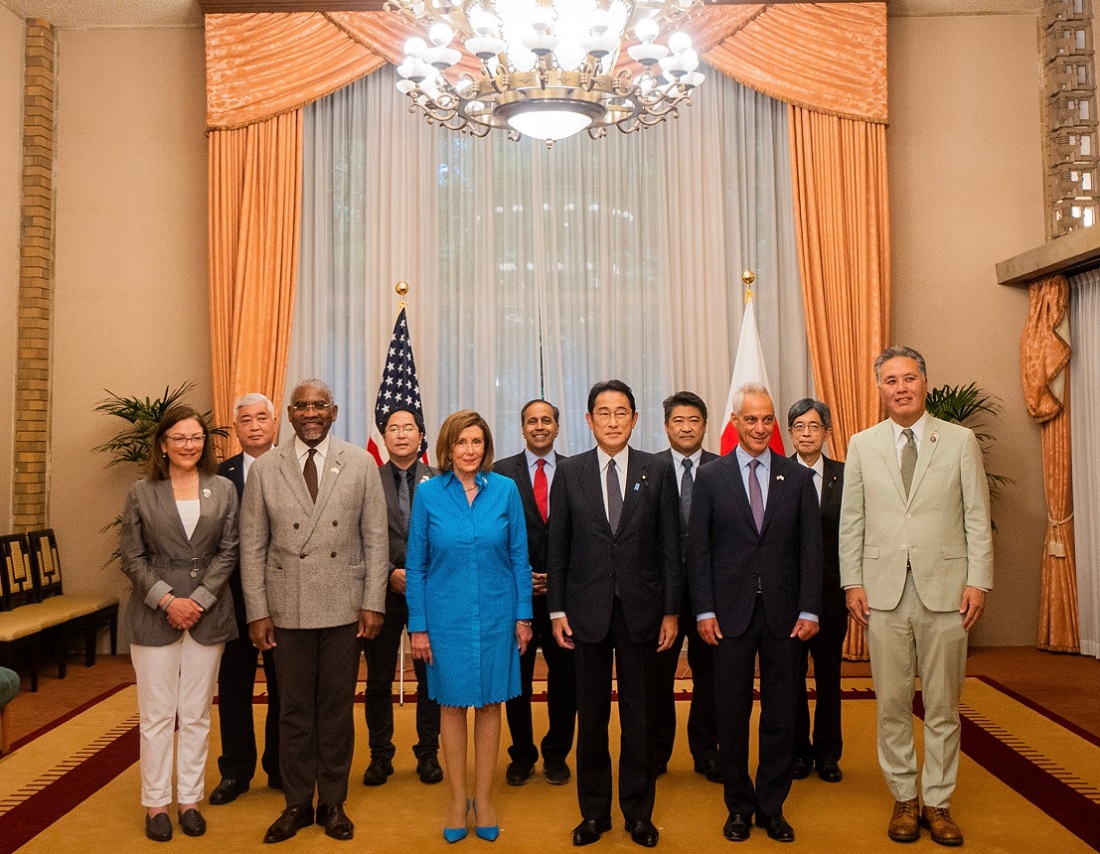 Speaker of the United States House of Representatives Nancy Pelosi with Japanese Prime Minister Fumio Kishida. (Image Credit: Twitter/ @SpeakerPelosi)
Speaker of the United States House of Representatives Nancy Pelosi with Japanese Prime Minister Fumio Kishida. (Image Credit: Twitter/ @SpeakerPelosi)
Nancy Pelosi’s controversial trip to Taiwan
In the buildup to Pelosi’s trip to Asia, the White House neither confirmed nor denied the reports that she would make a stop in Taipei, citing that the speaker is “independent in making her own decisions.” However, the Biden administration repeatedly tried to defuse the escalating situation by reiterating the U.S. endorsement of the ‘One China’ policy.
During a White House briefing on August 1, the U.S. National Security Council Coordinator for Strategic Communications John Kirby stated that “there’s no reason for this to escalate.” Kirby added that “the speaker has a right to visit Taiwan, and a speaker of the House has visited Taiwan before without incident, as have many members of Congress, including this year. The world has seen the United States government be very clear that nothing has changed, nothing has changed, about our One China policy.”
“One China” policy is the diplomatic acknowledgment of China’s position that there is only one Chinese government and that Taiwan is part of China. Beijing asserts sovereignty over Taiwan, a self-governing democracy of over 23 million people, which China sees as a breakaway province.
Nancy Pelosi arrived in Taiwan on the night of August 2, becoming the highest-ranking U.S. official to visit the Island in the last 25 years. Her visit to Taiwan stoked serious tensions between China and the United States. Beijing reacted aggressively and perceived her trip as an attempt to evoke an independence movement in the self-governing island of Taiwan. As soon as she landed in Taipei, China’s Defense Ministry announced a series of targeted military operations to “safeguard national sovereignty” in response to Pelosi’s visit and vowed to “resolutely thwart external interference and ‘Taiwan independence’ separatist attempts.”
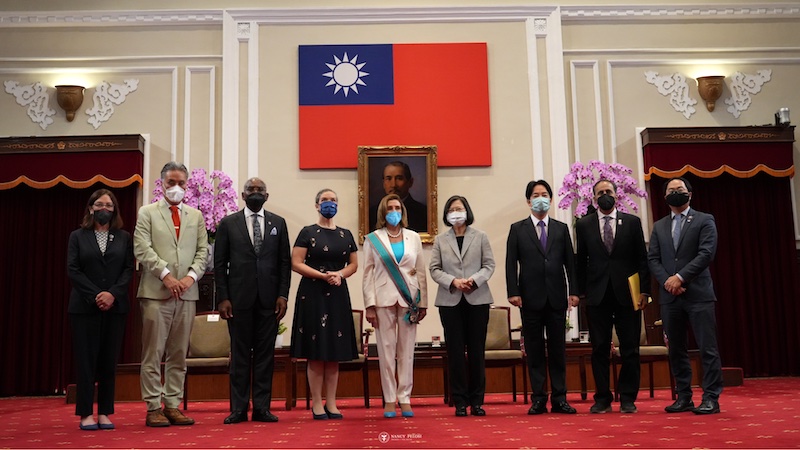 U.S. House Speaker Nancy Pelosi and congressional delegation with Taiwanese President Tsai Ing-wen, at Taiwan Presidential Office in Taipei, Taiwan, on Aug. 3, 2022. (Image Credit: @SpeakerPelosi/Twitter)
U.S. House Speaker Nancy Pelosi and congressional delegation with Taiwanese President Tsai Ing-wen, at Taiwan Presidential Office in Taipei, Taiwan, on Aug. 3, 2022. (Image Credit: @SpeakerPelosi/Twitter)
Taiwan’s role in the U.S.-China relations
A stable relationship between Washington and Beijing is one of the most significant and fragile links between East and West. The U.S. recognizes Taiwan as a part of China under the One China policy of 1979. However, the U.S. maintains a position of strategic ambiguity over Taiwan’s status. The ambiguous position also continues in defining whether or not the U.S. forces would intervene in an event of a Chinese invasion of Taiwan. U.S. policy towards Taiwan resides upon the foundations of the Taiwan Relations Act and Six Assurances, which does not clearly state the circumstances under which the U.S. would intervene militarily if a situation of conflict rises in Taiwan.
Despite reaffirming its commitment to the One China policy, the U.S. administration is never shy to proclaim its intent of military intervention in Taiwan to stop a conflict situation. During his visit to Tokyo in May 2022, U.S. President Joe Biden said that the U.S. would intervene militarily to defend Taiwan. Biden gathered harsh backlash from China for his remarks.
Pelosi’s political gains from her Taiwan trip
Pelosi’s defiance of China’s warnings has put a severe impact on U.S.-China relations. However, from her perspective, the California Democrat captured an unprecedented amount of international attention, never seen before for a U.S. House Speaker.
Pelosi's aircraft destination to Taipei became the most tracked flight in historic aviation. Upon reaching Taiwan, she sat down with the pioneering female leader of the self-governed Island, President Tsai Ing-wen. In the backdrop of rising tensions between the U.S. and China, a meeting between the two elected female politicians corroborated Pelosi’s long-standing endeavor to become an icon of global female politics.
"In the face of the Chinese Communist Party’s (CCP) accelerating aggression, our congressional delegation's visit should be seen as an unequivocal statement that America stands with Taiwan, our democratic partner, as it defends itself and its freedom," Pelosi said in a Washington Post op-ed that published as she reached Taipei.
I led a Congressional delegation to Taiwan to make crystal clear that America stands with the people of Taiwan – and all those committed to Democracy and human rights.
— Nancy Pelosi (@SpeakerPelosi) August 3, 2022
Check out this video of our historic visit to Taipei. pic.twitter.com/TON6zB3x4s
This is not the first time that Pelosi has targeted the CCP. In 1991, Nancy Pelosi defied the usual protocols during her trip to Beijing and stood on the site of Tiananmen Square holding a banner to mark her silent protest against the Chinese Communist Party. Although she did not have to face any direct consequences for her unannounced protest, her actions rattled the U.S. embassy in China and resulted in the arrest of CNN Beijing bureau chief Mike Chinoy.
Pelosi’s achievements during her Taiwan visit are largely personal and symbolic, however, her trip may shake the belief among Chinese leadership about U.S. commitment to the One China policy, which plays a pivotal role in defining the U.S.-China relationship.
China’s immediate reaction
Beijing wasted no time proclaiming its displeasure on Pelosi’s trip to Taiwan. China’s People’s Liberation Army (PLA) is conducting live-fire drills around Taiwan that started soon after Pelosi concluded her trip to Taiwan. A statement released by the PLA’s Eastern Theater Command defines the large-scale military exercise as a "targeted military operations to counteract the situation.” China also released a map that shows that the drills would encircle the Island of Taiwan from all sides.
Taiwan's Defense Ministry called China’s plans for live-fire missile drills and military exercises an attempt to enforce a "maritime and aerial blockade" on Taiwan and to "threaten international waterway, challenge the international order, undermine cross-strait status quo and endanger regional security."
China’s live-fire military drills also caused unease in Japan. One of the six demarcated areas for the drills around the island of Taiwan is in close proximity to Japan’s Yonaguni Island. Japan’s Defense Minister Nobuo Kishi said that five missiles were believed to have landed within Japan’s Exclusive Economic Zone (EEZ). “This is a serious problem that concerns Japan’s security and the safety of its citizens. We strongly condemn it,” Kishi said during a press conference.
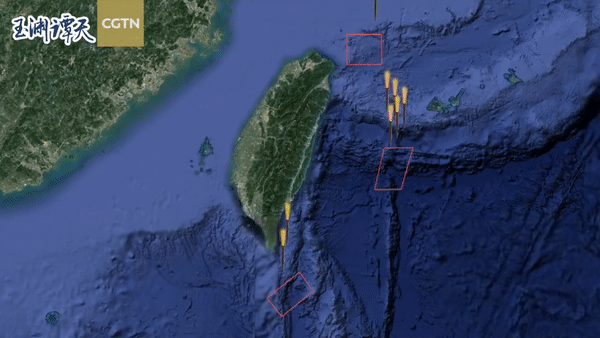 China launches live-fire drills near Taiwan. (Image Credit: CGTN)
China launches live-fire drills near Taiwan. (Image Credit: CGTN)
The large-scale military exercise, live-fire missile drills, and mobilization of Chinese fighter jets along the Taiwan strait is the immediate consequence that Taiwan is facing for hosting Pelosi against China’s will. Long-term consequences may be economic in nature. China's Ministry of Commerce has announced to immediately suspend the export of natural sand to Taiwan, which is an essential component for the production of semiconductor chips, the backbone of Taiwan’s economy. In the wake of China’s tightening grip, Taiwan has started negotiating with Japan and the Philippines to acquire alternative aviation routes in case China blocks its airspace for Taiwan.
In response to China’s military drills, U.S. Secretary of State Antony Blinken termed it as “aggressive military actions” and said that he hopes “Beijing will not manufacture a crisis or seek a pretense to increase its aggressive military action.” He further added that “The United States continues to have an abiding interest in peace and stability across the Taiwan Strait. We oppose any unilateral efforts to change the status quo, especially by force.”
Long-term global economic consequences of Pelosi’s visit to Taiwan
Chinese Communist Party and President Xi’s administration view Pelosi’s trip to Taiwan as a threat to its claims over the self-governed island. Nancy Pelosi is one of the highest-ranking U.S. officials and the third in line to become the President of the United States after Joe Biden and Kamala Harris.
Although China has launched military exercises to demonstrate its agitation directly against Taiwan, the long-term economic consequences of Pelosi’s visit to Taipei may ripple global market that is already suffering from the jitters of the Russia-Ukraine war and the COVID-19 pandemic.
In the wake of heightened tensions, it is expected that China may deploy its financial and economic weapons which it has in abundance. Similar to the increasing economic pressure on Taiwan, China might make it more difficult for U.S. companies to access the Chinese markets. Large-scale trade deals such as Boeing’s sale of the 737 Max plane might have to face more difficulties going through in the Chinese market.
Such actions would increase the rift between the world’s two biggest economies, bringing the two countries back to square one of the trade war that was initiated during President Trump’s time in the Oval office.
ALSO READ:
Regions
Issues

















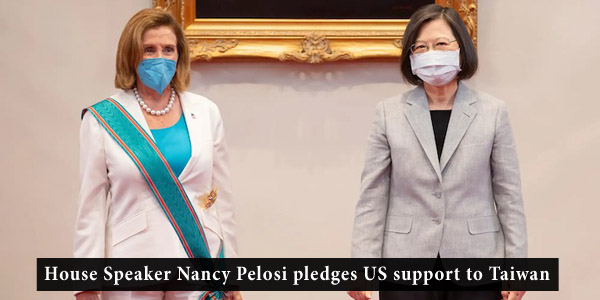 House Speaker Pelosi pledges US support to Taiwan
House Speaker Pelosi pledges US support to Taiwan U.S.-China Confrontation - Beginning of New Cold War?
U.S.-China Confrontation - Beginning of New Cold War?









